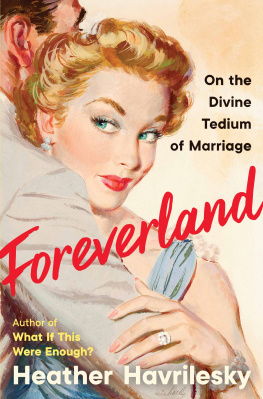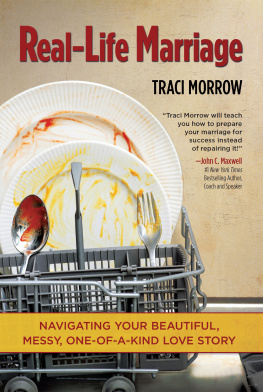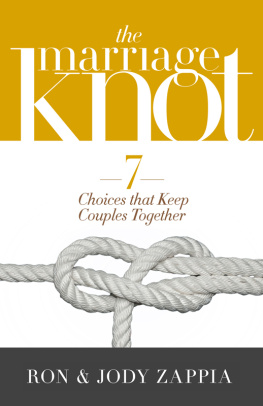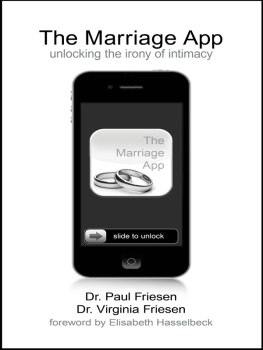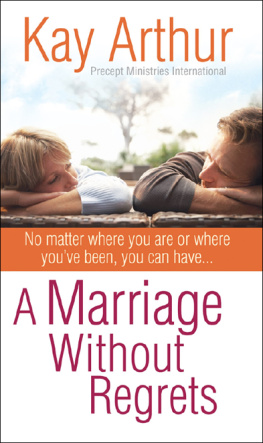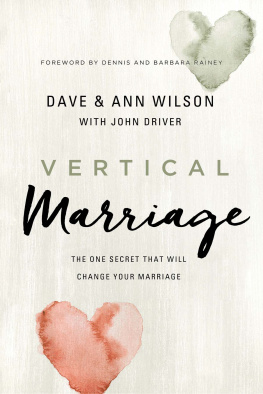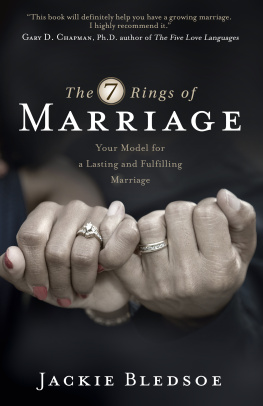FOR BILL
Contents
E very book about marriage is also a book about mortality, since the success of any marriage is defined not by happiness or good fortune but by death. The assignment, after all, is to stay together until you die. Once one spouse perishes, the marriage has succeeded. Death signals victory.
Only an optimistic fool would declare victory before reaching the finish line. Thats what makes weddings such dark comedies. Whats more entertaining and ominous than watching two naive souls sign a binding contract without understanding the fine print? Most engaged couples bumble onto the marital bullet train without even knowing where its headed. All that matters is that well be together, they whisper to each other. Forever is two immortal elves, sipping pink champagne by a burbling stream, then exploring the wild, gorgeous woods around them in everlasting harmony. Forever is set in New Zealand, not New Jersey.
Muddling through the first year of marriage has a way of turning New Zealand back into New Jersey, changing pink champagne into a juice box, and transforming two immortal elves into lumpy humans with a rapidly approaching expiration date.
Even after many satisfying years together, married life has an uncanny way of making even the most buoyant soul feel like a fool and a failure repeatedly. Its a feature, not a bug. Marriage is designed to break you. You will forget everything you knew before. You will tremble under the weight of your own shortcomings. Sure, you might bounce back and proclaim yourself lucky and declare your marriage happy and become the masochist your marriage wants you to be. But youll still wake up plenty of mornings wondering why you signed on to drag this wretched, snoring heap of meat with you everywhere you go until the day you die.
And once youre married and therefore a true masochist, youll realize that all of these sensations are part of the delicious tedium of matrimony. I wrote this book to explore that tedium, along with everything else that marriage brings: the feeling of safety, the creeping darkness, the raw fear and suspense of growing older together, the tiny repeating irritations, the rushes of love, the satisfactions of companionship, the unexpected rage of recognizing that your partner will probably never change. And in writing this book, I discovered new layers within my marriage and myself, haunting and chaotic, wretched and unlovable.
We talk about marriage like its just something people do, no big deal. We pretend that once youre married, youre either happy or unhappy, a binary system, on or off. But the truth is so much murkier and also much more frightening and exciting and joyful than that. Marriage grinds your face into the dirt until you can see new colors and taste new flavors. But you have to show up and invite it all in. You cant hide.
I recently watched Planet Earth II with my family, and the footage of various animals waiting not so patiently for their mates to return to the proper rendezvous point in order to make sweet marital bird love or regurgitate a fish smoothie into their throats was enough to send a chill down my spine. This penguin dad is seriously inept at scaling wave-tossed rocks and at locating his lady in a million-strong crowd of other penguin ladies screeching at the moon together, I found myself thinking. Does her screeching have the faintest hint of contempt to it, or am I just imagining that? Later, as a seabirds baby mama took her time showing up at their appointed meeting spot, I nervously wondered if shed wandered off with a more dashing seabird and left her devoted mate in the dust. (Okay, he did have a bad habit of pecking in a faintly insecure, unattractive way.) You could see the enormous misunderstandings in play: You do know that I almost got pulverized against the rocks diving for these fish? the harried penguin seemed to say with his beady black eyes once he finally arrived.
My younger daughter often proclaims that she will never get married. And why should she want to? As much as I prefer to believe that her father and I are setting a shining example of affectionate, radically open communication, the reality is that shes had a lifelong all-access pass to our version of a penguin marriage: the laborious diplomacy of marital negotiations, the low-key squabbling, the mutual suspensions of disbelief, the subtle undermining, the ever-increasing codependence. After fifteen years of this graceless ballet, its not surprising that all my daughter wants when she grows up is a tiny house, a subcompact car, and a mini Australian shepherd.
And honestly, there are days when the prospect of growing old next to a mini Aussie doesnt sound so bad when compared to the slowly blossoming garden of horrors inherent to aging in sync with another human. My incredibly handsome and charming husband, who is a tenured professor and looks a solid ten years younger than his numerical age, also has a quick temper, zero depth perception, and a palsy that makes his right hand shake whenever he passes me, say, a porcelain creamer filled to the brim with liquid nitrogen. Even though he and I mightve engaged in countless frank and illuminative discussions of our flaws, even though we mightve laughed several times about both his palsy and the remarkable ability of liquid nitrogen to cause a searing burn when it comes into contact with living tissue, that doesnt make the ensuing spillage and pain any less real. To be married is to have the words This is all your fault eternally poised on the tip of your tongue.
Marriage can feel like a moral litmus test that way. Your challenge is to maintain your composure as the staggering deficits of the highly ineffectual human by your side come into sharper and sharper focus. Somehow you have to keep your sense of humor (which studies suggest is crucial to a healthy marriage), minimize your contempt (a major predictor of marital dissatisfaction), and increase your joint take-home pay (currently the most accurate predictor of how long a marriage will last, according to some studies). So maybe my daughter is onto something. In an upgradable, consumer-driven, instant-gratification world where the experiences of shopping for high-end cell phones, high-end mates, and high-end sperm cells are hauntingly similar to each other, isnt it reasonable to question the value of a legal contract, written in ink, on paper, that involves disastrously punitive terms of dissolution? What kind of an old-fashioned mutant could crave such a primitive trap, particularly when its paired with an enormously expensive ceremony that often includes allusions to obedience and lifelong mutual suffering and death, of all things? And why do we arbitrarily marry one person instead of, say, two or three or fifteen? Doesnt that place an inordinate amount of pressure on one very fragile penguin?
These days, there are limited economic advantages to marriage, a planets worth of mates more easily perused and accessed now than ever before in human history, and a host of inconveniences to being married, along with untold drudgery, monotony, frustration, and regret. Add to that the fact that 40 to 50 percent of all marriages in the United States end in divorce anyway. Considering all of that, what could possibly be the point of this outdated charade?
This book represents my personal attempt to understand why I signed myself up for the worlds most impossible endurance challenge. Having someone by your side every minute of your life sounds so romantic before hes actually there, making noises, emitting smells, undoing what youve just done, interrupting, undercutting, begging to differ. Sure, I love my husband. But I am still a simple animal, and sometimes I lose the thread. Thats when I find myself asking awkward questions, such as: Why do I need a husband, again? And if Im going to have a husband, shouldnt I have chosen a sturdier one, or maybe one with a fully functioning frontal lobe? Also, why do I get

